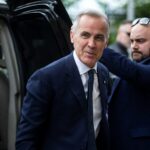The marble floors of Toronto’s Fairmont Royal York Hotel fell silent as Bank of Canada Governor Tiff Macklem took the podium Tuesday morning. His message to the assembled financial elite was clear and unprecedented: Canada’s central banking framework needs fundamental reform to weather an increasingly volatile global economy.
“The world has changed dramatically,” Macklem stated, his typically measured tone carrying new urgency. “The pandemic, geopolitical conflicts, and climate-related disruptions have created a more shock-prone economic environment that demands a more adaptable monetary policy framework.”
The Governor’s remarks come at a critical juncture, as the Bank of Canada’s five-year mandate renewal approaches in 2026. Currently operating under a 2% inflation target, Macklem suggested the mandate should evolve to grant the central bank greater flexibility when responding to unexpected economic crises.
Financial markets reacted swiftly to Macklem’s speech, with the Canadian dollar dipping 0.3% against its U.S. counterpart as traders reassessed the implications of potential policy shifts. Bond yields also saw movement as investors parsed the Governor’s words for clues about future interest rate decisions.
“We’re not seeking to abandon our inflation target,” Macklem clarified. “Rather, we need tools that allow us to address financial stability concerns while maintaining price stability—twin objectives that sometimes require different approaches.”
The proposed changes would formalize practices the Bank adopted during recent crises. During the pandemic, the BoC deployed unprecedented monetary measures, including quantitative easing and forward guidance, stretching beyond its traditional toolkit. These emergency actions, while effective in stabilizing markets, operated in a regulatory gray area.
Economists are divided on Macklem’s proposal. “There’s merit in codifying crisis responses,” noted Benjamin Reitzes, managing director at BMO Capital Markets. “But any mandate expansion risks diluting accountability and creating confusion about the Bank’s primary objectives.”
The potential mandate change occurs against a backdrop of public scrutiny over the Bank’s performance. With inflation having surged to a four-decade high of 8.1% in 2022, many Canadians questioned whether the BoC had lost control of its core mission. Though inflation has since moderated to 2.9%, the economic damage and credibility loss remain significant.
Finance Minister Chrystia Freeland, who must approve any mandate changes, offered measured support. “We value the Bank’s operational independence while ensuring its objectives align with Canadians’ economic interests,” her office stated. “We will evaluate any proposals through this lens.”
International precedent exists for Macklem’s vision. The U.S. Federal Reserve operates under a dual mandate targeting both inflation and employment, while the European Central Bank recently incorporated climate considerations into its policy framework.
Business leaders attending Macklem’s speech expressed cautious optimism. “Companies need stability to plan investments,” said Toronto Chamber of Commerce President Daniel Hendriks. “If these changes can reduce economic volatility, they merit serious consideration.”
The mandate renewal process will involve extensive consultation with financial experts, business leaders, and the public. As Canadians continue recovering from inflation’s impact on household budgets, the Bank’s policy decisions will face unprecedented scrutiny.
“The ultimate test of any central bank framework,” Macklem concluded, “is whether it serves the economic welfare of Canadians in both calm and turbulent times. That’s the standard by which our proposals should be judged.”
For more insights on financial developments affecting Canadians, visit our CO24 Business section, where we provide in-depth analysis of economic trends shaping our nation’s future.

























